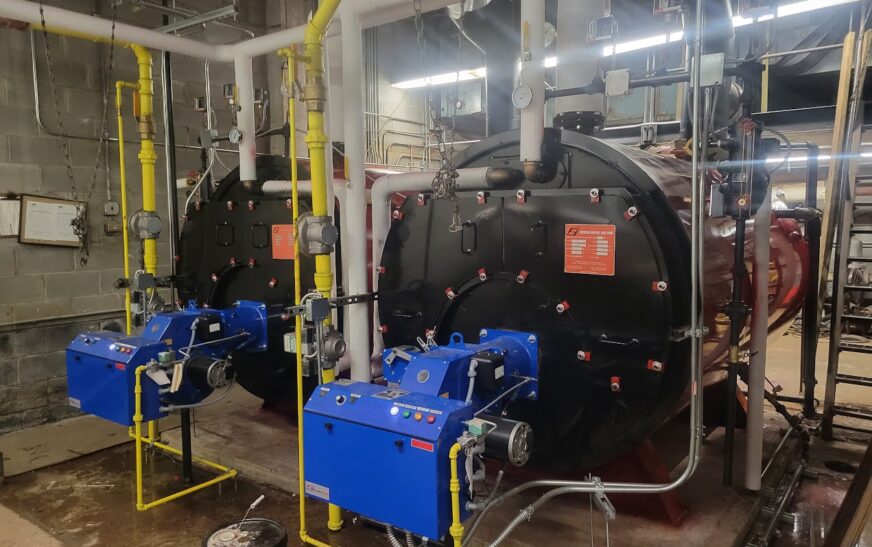Industrial boilers are part of most operations in industries, ranging from food processing and power generation to chemical manufacturing and oil refining. Among the different types of boilers, fire-tube and water-tube boilers are the most common. Choosing the right Industrial boiler type will have a significant impact on operational efficiency, safety, and overall costs.
In this blog, we are going to go deeper into the basic differences of fire-tube and water-tube boilers, weigh the advantages and disadvantages, and go deep into their applications in helping you choose which one is right for you.
Understanding Fire-Tube Boilers
Fire-tube boilers are among the oldest types of boilers, characterized by their simple and robust design. In these systems, hot gases produced from the combustion process pass through tubes surrounded by water. The heat transfer occurs from the hot gases to the water, ultimately creating steam.
Key Features of Fire-Tube Boilers:
- Structure: A cylindrical shell contains water, with fire tubes running through it.
- Heat Transfer: The heat is transferred from the hot gases inside the tubes to the surrounding water.
- Output Pressure: Generally suitable for low to medium pressure applications, generally up to 250 psi.
- Efficiency: The fire-tube boilers are not as efficient as the water-tube boilers at very high pressures or temperatures.
Advantages of Fire-Tube Boilers
- Simple Construction: The design is simple and, therefore, easier to install and maintain.
- Cost-Effective: The initial cost is lesser compared to the water-tube boilers.
- Compact Design: Suitable for spaces with limited area.
- Operation: They can manage the variation in demand reasonably well.
Disadvantages of Fire-Tube Boilers:
- Low Capacity: Their design limits them to low steam generation.
- Response Time: They take time to start and take up changes in load.
- Risk of Catastrophic Failure: If it fails, it is likely to cause considerable damage because of the large volume of water under pressure.
Applications of Fire-Tube Boilers:
- Heating in buildings
- Small-scale industrial applications
- Laundry and textile places
- Food and beverage production

Knowledge About Water-Tube Boilers
Water-tube boilers function by having water passing inside the tubes surrounded by hot combustion gases. This design offers an excellent heat transfer as well as the ability to be set up at higher pressure levels and temperatures.
Characteristics of Water-Tube Boilers:
- Configuration: It has numerous tubes with water circulating, which is surrounded by burning combustion gases.
- Heat Transfer: Heat is transferred from the surrounding hot gases to the water inside the tubes.
- Output Pressure: Designed for high-pressure applications, often exceeding 1,500 psi.
- Efficiency: High thermal efficiency due to the design and higher pressure capabilities.
Advantages of Water-Tube Boilers:
- High Efficiency: Can handle high pressures and temperatures with excellent thermal performance.
- Scalability: Suitable for applications that require large steam output.
- Quick Start-Up: Responds faster than fire-tube boilers.
- Safety: Breakages are typically less destructive since the volume of water is smaller in the system.
Disadvantages of Water-Tube Boilers:
- Intricate Design: The design is more complicated, which makes them more difficult to install and service.
- Higher Installation Costs: Their design is more complex, and therefore more money is spent in the installation phase.
- Space Requirements: Space for ancillary equipment such as pumps and control systems may be more required.
Applications of Water-Tube Boilers:
- Power plants
- Petrochemical industries
- Large-scale manufacturing
- Marine and naval applications
Fire-Tube vs. Water-Tube Boilers: A Comparative Review
To make a selection, it is necessary to understand how these two types of boilers compare in terms of design, performance, and operational considerations.
1. Design and Construction:
- Fire-Tube Boilers: Simpler design with fewer components results in a more compact and easily installed boiler.
- Water-Tube Boilers: Complex construction with multiple tubes results in a larger footprint and an intricate installation process.
2. Efficiency:
- Fire-Tube Boilers: Lower efficiency when operating at high pressures and temperatures.
- Water-Tube Boilers: Higher thermal efficiency and better for high-pressure, high-temperature jobs.
3. Safety:
- Fire-Tube Boilers: Prone to catastrophic failure as there is much large volume of water under pressure.
- Water-Tube Boilers: Less risky because failures are less likely to cause major damage.
4. Maintenance:
- Fire-Tube Boilers: Relatively easy to maintain because the design is simpler.
- Water-Tube Boilers: More specialized knowledge and effort in maintenance.
5. Cost:
- Fire-Tube Boilers: Lower initial investment and maintenance costs.
- Water-Tube Boilers: Higher initial cost, but possibly reduced operating cost due to high efficiency.
6. Scalability and Capacity:
- Fire-Tube Boilers: Suitable for low and smaller steam-generating capacities.
- Water-Tube Boilers: Highly suitable for large capacity industrial requirements
How to Choose the Right Boiler for Your Need?
When selecting whether a fire-tube or water-tube boiler best suits your needs, it’s a matter of recognizing your operational needs and constraints. The following are some basic evaluation considerations in choosing between either, boiled down to one:.
1. Application and Industry Requirements:
For high steam output with efficiency, a water-tube boiler is the best for power generation.
For smaller projects that require less steam production and have a limited budget, a fire-tube boiler can be used.
2. Pressure and Temperature Requirements:
- Water-tube boilers are typically required for high-pressure applications.
Low to medium pressure systems can be adequately satisfied by fire-tube boilers.
3. Budget Considerations
- Fire-tube boilers have an initial lower cost and are more straightforward to maintain.
Although water-tube boilers have higher installation costs, their efficiency can pay off in the long run.
4. Space Requirements:
- Fire-tube boilers are ideal for small facilities because they save space.
Water-tube boilers require more space for auxiliary equipment.
5. Flexibility of Operation
- Industries that have variable steam requirements can take advantage of the quicker response time of water-tube boilers.
6. Safety
- If safety is a primary concern, especially in high-pressure applications, then water-tube boilers are safer.
Supreme Boilers: Reveal Premium Boiler Solutions.
Supreme Boilers is trusted for being reliable and efficient within industrial boiler manufacturing. Boilers can vary depending on individual industries but can always focus on their quality and duration. Here’s their FPS series, perfect for heavy-duty boilers with the fire-tube design; there’s the FST series, best suited for those looking for optimum efficiency along with superior safety in their product. For cutting-edge water-tube designs, the ESP Series offers unmatched thermal performance, while the PLW Series provides compact solutions ideal for space-constrained facilities. Want scalable and high-capacity solutions? The SM4 Series and SM5 Series are designed to handle your most demanding applications with ease. Come visit Supreme Boilers today and find the perfect boiler for your needs and elevate your industrial operations with industry-leading innovation and expertise.
Conclusion
Choosing a fire-tube or water-tube boiler is a significant decision affecting not only your operation but also the safety of your facility and its long-term cost.
Fire-tube boilers are ideal for simplicity, low cost, and small-to-medium scale operations, but for those who require relatively constant steam output. Conversely, high-pressure applications, with high temperatures required in applications where performance and capacity need to be scaled up are ideal with water-tube boilers.
By carefully evaluating your specific requirements—considering factors like application, budget, space, and safety—you can select the boiler type that aligns with your operational goals. For industries with diverse and dynamic needs, consulting with a boiler specialist can provide additional insights to optimize your choice.








